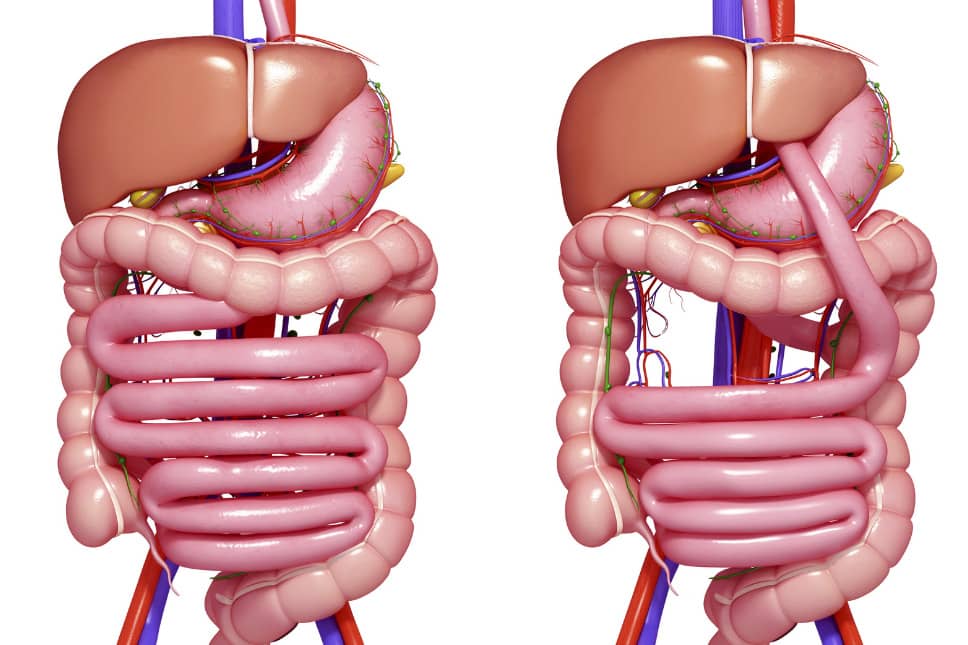
Gastric Bypass
The gastric bypass, also known as Roux-en-Y gastric bypass, is one of the most common and effective bariatric surgery procedures. It consists of two parts: in the first, the surgeon divides the stomach into a small and a large section. The small section of the stomach, called the “pouch,” is closed off and separated from the rest of the stomach. In the second part, the surgeon connects a part of the small intestine directly to the stomach pouch. This means that the food you ingest will go directly from the stomach pouch to the small intestine, bypassing most of the stomach and the small intestine.
This procedure reduces the amount of food you can consume and the amount of calories and nutrients your body absorbs from the food, which helps you lose weight. Additionally, by changing the way food passes through your digestive system, the gastric bypass also affects intestinal hormones, which can help improve conditions associated with obesity, such as type 2 diabetes.
Pre-Surgical Process
Before any bariatric surgery procedure, there are several important steps that need to be completed:
Medical Evaluation: #1
This will include a series of tests and evaluations to make sure you are healthy enough for surgery. These tests may include blood tests, heart tests, lung function tests, and other necessary exams.
Psychological Evaluation: #2
It is important to make sure you are mentally prepared for the surgery and the lifestyle changes that will follow. A psychologist or psychiatrist will evaluate your mental state and help determine if you are ready for the procedure.
Education: #3
You will need to fully understand the procedure, the risks involved, and the lifestyle changes you will need to make after the surgery.
Preoperative Diet:#4
Depending on your individual situation, you may need to follow a special diet before the surgery to reduce the size of your liver and make the operation easier.
Post-Surgical Process
After the surgery, there are several important steps to ensure you recover properly and achieve the best possible results:
Postoperative Diet: #1
After the surgery, you will need to follow a special diet to help your body recover and adjust to the changes in your digestive system. This diet will start with clear liquids and gradually progress to more solid foods.
Exercise: #2
Regular exercise is crucial for maintaining weight loss and improving your overall health.
Nutritional Supplements: #3
Because bariatric surgery alters your digestive system, you may need to take nutritional supplements to ensure you get all the necessary nutrients.
Medical Follow-Up:#4
You will have regular appointments with your doctor and other specialists to monitor your progress and make sure you are recovering well.
Specialists Involved
Depending on your individual situation, several specialists may be involved in your pre and postoperative care:
Bariatric Surgeon: #1
This is the doctor who will perform the surgery. They should be a surgeon with experience and specialized training in bariatric surgery.
Primary Care Physician: #2
Your primary care physician will be involved in your pre and postoperative care, helping to coordinate your care and make sure you are healthy for the surgery.
Nutritionist: #3
A nutritionist will help you plan your pre and postoperative diet and help you make the necessary changes to your diet to ensure you get the necessary nutrients.
Psychologist/Psychiatrist: #4
A psychologist or psychiatrist will evaluate your mental health before the surgery and may help you address any emotional or mental health issues after the surgery.
Accordion TitleExercise Specialist: #5
An exercise specialist can help you plan an exercise program that is suitable for your fitness level and goals.



ConexionMed
At conexionMED, we connect you with highly trained specialists in each of these areas to ensure you receive the best possible care before and after your bariatric surgery in Colombia.




